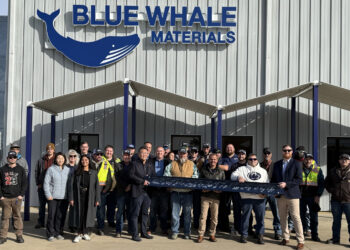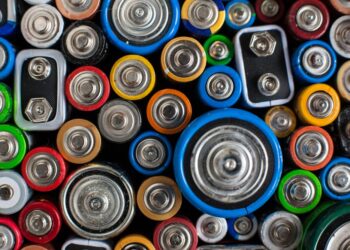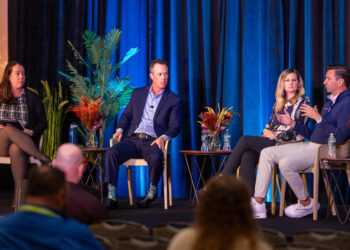Canadian battery processor Li-Cycle filed for bankruptcy, after warning for months of impending financial trouble, and is continuing to try to find a buyer that will allow it to continue operations.
In April, the company noted in SEC filings that its ability to “achieve or sustain profitability” and repay its debts was in doubt, as was its ability to fulfill the requirements of a federal loan needed to build its Rochester Hub facility in New York. Li-Cycle paused construction on the facility in 2023.
In May, shortly before filing for bankruptcy, Li-Cycle suspended operations at its Arizona and Alabama facilities, laid off 30 employees and furloughed at least 80 more. As of May, it was not able to pay rent, court documents noted.
In addition, Ajay Kochhar, who co-founded Li-Cycle in 2016, stepped down from the board of directors and from his role as president and CEO effective May 15. The board appointed a chief restructuring officer, William Aziz, and brought on Michelle Faysal as interim chief financial officer after Craig Cunningham stepped down.
On May 14, Aziz filed bankruptcy documents in New York. The documents included a list of more than 50 entities Li-Cycle is obligated to repay. The company is also in bankruptcy proceedings in Canada, which started on May 12.
“While Li-Cycle has considerable potential and is poised to become an industry leader to take advantage of the growth of the EV supply chain, Li-Cycle has encountered numerous challenges since the fall of 2023,” the documents noted. “These challenges have severely strained Li-Cycle’s liquidity, and have adversely impacted its ability to operate its Spokes and to continue the development of the Rochester Hub.”
Those challenges include the rising cost to construct the Rochester Hub, “the filing of various putative securities actions and an arbitration claim” by the general contractor MasTec Industrial for the Rochester Hub, the pricing for feedstock and relatively depressed commodity prices and its inability to raise additional financing.
Due to those problems, the filing noted, the share price of its common shares declined by over 99% since construction stopped in Rochester Hub and the company was delisted from the New York Stock Exchange on March 9. It defaulted on loans and reduced its workforce from 536 employees as of Sept. 30, 2023, to 119.
Earlier in the year, Li-Cycle also explored a sale, as smelter Glencore expressed interest in a potential transaction in mid-March and the company engaged two advisor companies to explore sale options. After filing for bankruptcy protection, it opened a first bid phase on May 12, selected a number of qualified letters of intent, and opened a second phase of bidding with a deadline of June 27.
Current locations, operations
Li-Cycle has three “spoke” locations with associated warehouses for storage and the partially completed Rochester Hub location.
The New York Spoke is also in Rochester. It opened in late 2020 and was upgraded in 2022, making it a “Generation 2” modular facility. The lease runs to June 30, 2029. It has a total processing capacity of 8,000 metric tons per year, split between a main line recycling capacity of 5,000 tons and ancillary processing capacity of up to 3,000 tons.
Operations at the Gilbert Spoke in Arizona started in May 2022, with a lease signed until Feb. 29, 2032. The facility is considered “Generation 3,” meaning it’s a modular build with multi-stage shredding – including the ability to shred full-pack EV batteries. It has an annual processing capacity of 23,000 metric tons. The main line has a capacity of 10,000 tons, and the ancillary processing makes up the remaining 13,000 tons of capacity.
In addition, there are two warehouses in Mesa, Arizona, with leases ending Dec. 31, 2026, and May 21, 2034.
In Tuscaloosa, Alabama, there’s another “Generation 3” facility with a main line processing capacity of 10,000 metric tons per year and ancillary processing capacity of up to 5,000 metric tons per year. That location came online in October 2022 and is leased through June 30, 2042.
Li-Cycle also has a storage facility near Tuscaloosa through Dec. 31, 2030, and an office near Birmingham, Alabama that was used as an engineering office for the Rochester Hub project that is leased through Nov. 30, 2027.
Finally, the Rochester Hub, which was slated to be Li-Cycle’s first commercial Hub, was also meant to be the first commercial hydrometallurgical resource recovery facility in North America, with input capacity to process 35,000 metric tons of black mass and equivalent feedstock annually.
Rochester Hub faced rising costs
The Rochester Hub facility was planned to serve as a regional hub, located on 41 acres in the same business park as Li-Cycle’s Rochester spoke facility.
Originally announced in 2020, the project was to cost $175 million and commissioned in stages starting in 2023. In 2023, it was still under construction, and Li-Cycle announced a conditional $375 million loan from the U.S. Department of Energy, to cover the rising costs. Then, it announced the pause in construction in October 2023, due “to escalating construction costs beyond its previously disclosed budget of $560 million,” the bankruptcy documents added.
A comprehensive review found that the revised project costs could be $850
million to $1 billion.
“The escalating costs were specifically related to the installation and labor costs for mechanical equipment, piping, structural steel, electrical and instrumentation for the measurement and process control devices,” the documents noted.
With those costs in mind, Li-Cycle revised the scope of the facility. It had initially planned that the Rochester Hub would produce lithium carbonate, nickel sulphate and cobalt sulphate, but instead decided to build and operate only the areas needed to produce lithium carbonate and mixed hydroxide precipitate, which would allow the facility to be finished for $508 million.
In November 2024, the company negotiated a higher DOE loan — $475 million. However, that loan had conditions, including funding about $173 million in reserves, of which up to approximately $97 million could be letters of credit, and paying $89.7 million in existing commitments on the project.
Li-Cycle could not meet those funding requirements, it announced in April. The first advance under the DOE Loan must occur by Nov. 7, 2025, for the loan to remain valid.
In the bankruptcy documents, Li-Cycle noted that until March 2024, it had no secured debt, instead funding its development through common shares and unsecured convertible notes.
“The completion of the Rochester Hub is a key element to bring Li-Cycle to profitability,” the documents noted. “With construction of the Rochester Hub on hold and with costs to complete construction requiring significant investment, estimated at approximately $483.3 million, Li-Cycle has actively sought and pursued a variety of strategic investments and alternatives.”
Smelter Glencore loaned the company $327.5 million as of Dec. 31, 2024, Li-Cycle’s only secured lender.
“Li-Cycle has been unable to execute a viable transaction or obtain sufficient additional investment,” the documents stated. “Among other things, potential investors raised concerns during the process about the ongoing availability of the DOE Loan Facility in light of uncertainty regarding the financing of ‘green initiatives’ in the current political climate in the United States.”
Other legal woes
In addition to defaulting on debts owed, Li-Cycle noted that the sharp drop in its share price following the consumption pause “resulted in the commencement of several putative class and derivative actions” in both Canada and the United States.
Further, general contractor MasTec’s arbitration claim is for at least $48.7 million plus interest, fees, costs and expenses. Li-Cycle counter-claimed, alleging “improperly inflated values for work and staffing” and requested a revised amount of $27.3 million plus interest, fees and expenses. The arbitration hearings are scheduled to start on July 21, 2026, in New York City.































